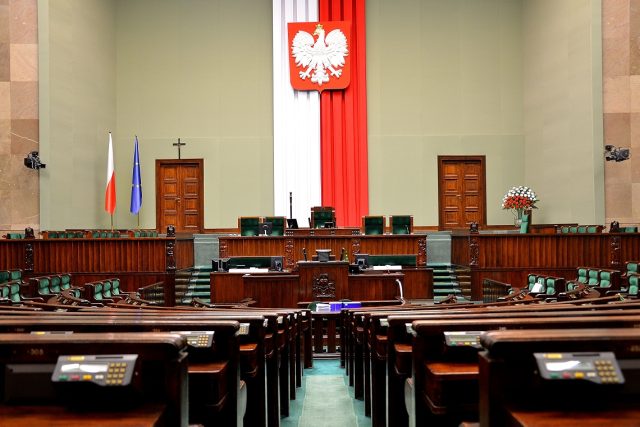After a contentious debate Thursday, the Sejm, the lower house of the Polish legislature, voted on four abortion–related proposals Friday and created an Extraordinary Committee to draft new abortion laws. Meanwhile, the EU Parliament voted to include the right to a safe and legal abortion in the EU Charter of Fundamental Rights, specifically condemning Poland’s near-total abortion ban.The four votes in the Sejm were on motions to dismiss four proposals to amend the current abortion law, which faced their first readings Friday. The first bill, Bill 176, would decriminalize abortions up to 12 weeks and afterward in cases of severe, incurable conditions. After the bill’s first reading, the Sejm voted on a motion to quash the proposal, with 204 voting to quash the proposal and 223 voting for the proposal to move on to the next step in the legislative process. The second bill, Bill 177, would decriminalize the assistance of women in obtaining an abortion. The motion to dismiss the bill also failed, with 206 voting to dismiss the bill and 222 voting for the bill to continue through the legislative process.The third bill, Bill 223, would reverse a 2020 ruling from the Polish Constitutional Court, which further limited the right to abortion. The motion to quash the bill failed, with 171 voting to quash the bill and 244 voting to allow it to continue through the legislative process. The fourth and final bill, Bill 224, would specifically address the regulation of the right to an abortion by the Polish government. 206 voted to quash the bill, and 222 voted to allow it to continue through the legislative process. The Sejm also created an Extraordinary Committee to examine the abortion-related draft laws. The committee met for the first time Friday, with MP Dorota Łoboda being chosen as the chairwoman.The contentious Thursday debate on the four proposals elicited mixed reactions from politicians and religious leadership in the staunchly Catholic country. Polish Equality Minister Katarzyna Kotula claimed Thursday that it is easier in Polish hospitals for Catholic patients to obtain access to holy relics than it is for a woman to access an abortion. Kotula celebrated the parliamentary votes to allow the four proposals to go forward in the legislative process Friday, expressing hope for a substantive and meaningful debate about abortion in the country.However, former Polish Children’s Ombudsman and representative for Catholic clergy in the country Mikolaj Pawlak expressed concern over the vote to Polish state media outlet PAP, citing the proposals’ incompatibility with Article 2(1) of the Law on the Ombudsman of Children. That article states, “[A] child is every person from the moment of conception until the age of majority.”The votes came one day after the EU Parliament voted to include the right to a safe and legal abortion in the EU Charter of Fundamental Rights. The Parliament voted to add the words, “everyone has the right to bodily autonomy, to free, informed, full and universal access to SRHR, and to all related healthcare services without discrimination, including access to safe and legal abortion,” to Article 3 of the charter. The proposal approved by the Parliament also specifically condemned Poland for criminalizing abortion in contravention of the 2022 World Health Organization (WHO) Guidelines. Abortion has been a fraught topic in deeply Catholic Poland for some time, creating deep political tensions with the rest of the EU. In December 2023, the European Court of Human Rights (ECHR) ruled in a 5-2 vote that a Polish court violated a woman’s right to private and family life by forcing her to travel abroad to receive an abortion due to a fetal anomaly. In June 2023, Polish health authorities claimed that a woman who died of sepsis after going into early labor and was denied an abortion due to the presence of a fetal heartbeat had her rights as a patient violated.In 2020, Poland’s Constitutional Court ruled that even in cases of fetal defects, abortion is not legal unless extenuating circumstances such as rape or incest are present, leading to mass protests as the near-total abortion ban put in place by the ruling came into effect. The ruling came less than a year after the Polish Parliament voted on the Stop Abortion Bill, which faced global criticism for proposing similar restrictions. The Parliament considered another similar bill in 2018, eventually walking the proposal back after thousands of Polish women held a nationwide strike in protest against the proposed law.




The Most Read
Сryptocurrencies
Bitcoin and Altcoins Trading Near Make-or-Break Levels
Financial crimes
Thieves targeted crypto execs and threatened their families in wide-ranging scheme
Financial crimes
Visa Warning: Hackers Ramp Up Card Stealing Attacks At Gas Stations
News
Capitalism is having an identity crisis – but it is still the best system
Uncategorized
The 73-year-old Vietnamese refugee is responsible for bringing Sriracha to American consumers
Uncategorized
Electric Truckmaker Rivian, Backed By Amazon, Ford, Raises Whopping $1.3 Billion